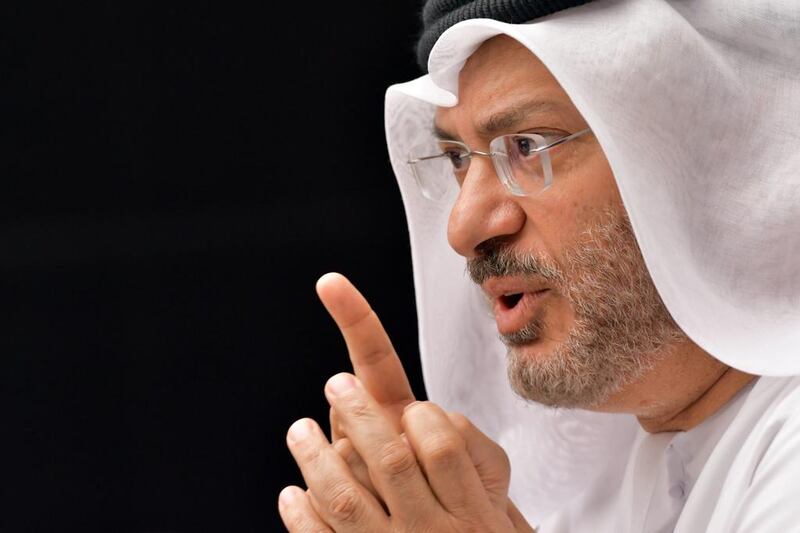ABU DHABI // Diplomacy remains the priority in resolving the dispute with Qatar, the Minister of State for Foreign Affairs Anwar Gargash said on Saturday, but the GCC member could be expelled from the regional bloc if demands for changes to its policies are not met.
“The alternative is not escalation, the alternative is parting of ways, because it is very difficult for us to maintain a collective grouping,” Mr Gargash told reporters in Dubai.
“This is not about regime change, this about behavioural change,” he added.
Resolving the crisis through diplomacy – which is being led within the GCC by Kuwait – is still a priority, despite Qatar’s leaking of a list of 13 demands on Friday, Mr Gargash said. But, he added, this leaking had undermined mediation efforts.
“The mediators’ ability to shuttle between the parties and try and reach a common ground has been compromised by this leak,” he said. “Their success is very dependent on their ability to move but not in the public space.”
After mounting pressure from the US state department to present a precise – and “reasonable” – list of demands to Qatar, the UAE, Saudi Arabia, Bahrain and Egypt sent a list, via Kuwaiti mediators, that detailed far-reaching requirements amounting to a complete reorientation of Doha’s foreign policy and strategy for projecting its influence.
The four countries claim that Qatar backs extremist forces in the region, including Islamist parties, and say its regional policies attempt to undermine their collective security for Doha’s own gain. Qatari officials deny allegations that they fund terrorism and say the four countries’ motivations are political. Qatar’s foreign minister also said last week, before the list of demands was submitted, that his country would not negotiate until the economic boycott imposed on June 5 by its three GCC neighbours was lifted.
It is not clear if the list of demands, submitted on Thursday, is a starting point for talks or if they are non-negotiable, but Qatar was given 10 days to respond.
The demands include the closure of Qatar’s Al Jazeera news network and other Doha-backed media outlets, the shutting of a permanent Turkish military base, and ending support to the Muslim Brotherhood and affiliated groups. The countries have also demanded that Doha significantly scale back its ties with Iran.
Qatar’s foreign affairs ministry said on Friday it was studying the list “in order to prepare an appropriate response”.
Bahraini foreign minister Khalid Al Khalifa said on Twitter that while the countries taking action against Qatar respected its sovereignty, they would not allow it to attempt to interfere in others’ internal affairs or to support terrorism.
The US, the most important international partner for Saudi Arabia, the UAE and Qatar, is seen as having a key role to play in bringing about a resolution. But so far the White House, state department and Pentagon have not appeared to be in agreement on how to proceed.
US president Donald Trump initially backed the moves against Qatar, while secretary of state Rex Tillerson has taken on the role of chief US mediator, calling for the demands on Doha to be “reasonable and actionable”.
The US military including the defence secretary has repeatedly backed Qatar, and praised its cooperation against terrorist groups. The US military agreed to a deal for up to 36 F-15 fighter jets last week, and completed joint naval exercises with Qatari forces. The largest US base in the region is in Qatar, and 11,000 US forces are stationed there.
Mr Tillerson has participated in dozens of phone calls and meetings with Gulf leaders during his mediation efforts, but it increasingly appears that Qatar’s bid to bring the US more directly into talks is not gaining traction.
“We believe it’s a family issue and that they should work out. If we can help facilitate those discussions, then so be it,” White House spokesman Sean Spicer said on Friday. “But this is something that they want to and should work out for themselves.”
tkhan@thenational.ae





